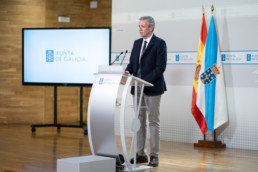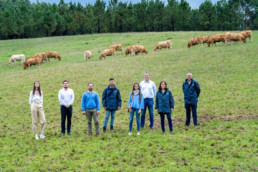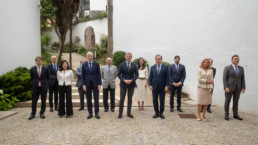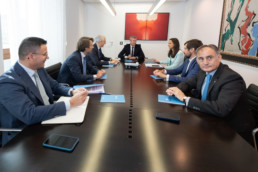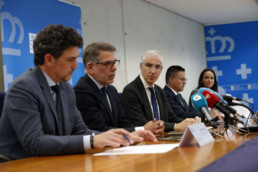The project for the sustainable management of Galician forests, whose industrial promoter is Altri, declared by the Xunta de Galicia as strategic
Rueda points out that it is a "unique initiative in Europe" that integrates plants and pulp and lyocell and urges the government to clarify whether it will access European funds.
He stresses that the market for sustainable cellulosic fibres has a high growth potential because "they are more environmentally friendly than artificial fibres" and are increasingly in demand in the sector.
With an investment of more than 800 million euros, the initiative plans to produce up to 200,000 tonnes of lyocell per year.
The President of the Xunta de Galicia, Alfonso Rueda, announced the declaration of the project for the sustainable management of Galician forests, which includes the start-up of Altri's textile fibre factory in Palas de Rei (Lugo), as a strategic industrial project for Galicia. The initiative, the only one of its kind in Europe and part of the Galician Transformation Hub, has been given this status in order to facilitate its administrative processing. "It is an innovative and ambitious project to produce lyocell, a high quality fabric, more environmentally friendly than artificial fibres and increasingly demanded by the textile industry worldwide", Rueda stressed, who emphasised that "there is no similar project planned in Europe".
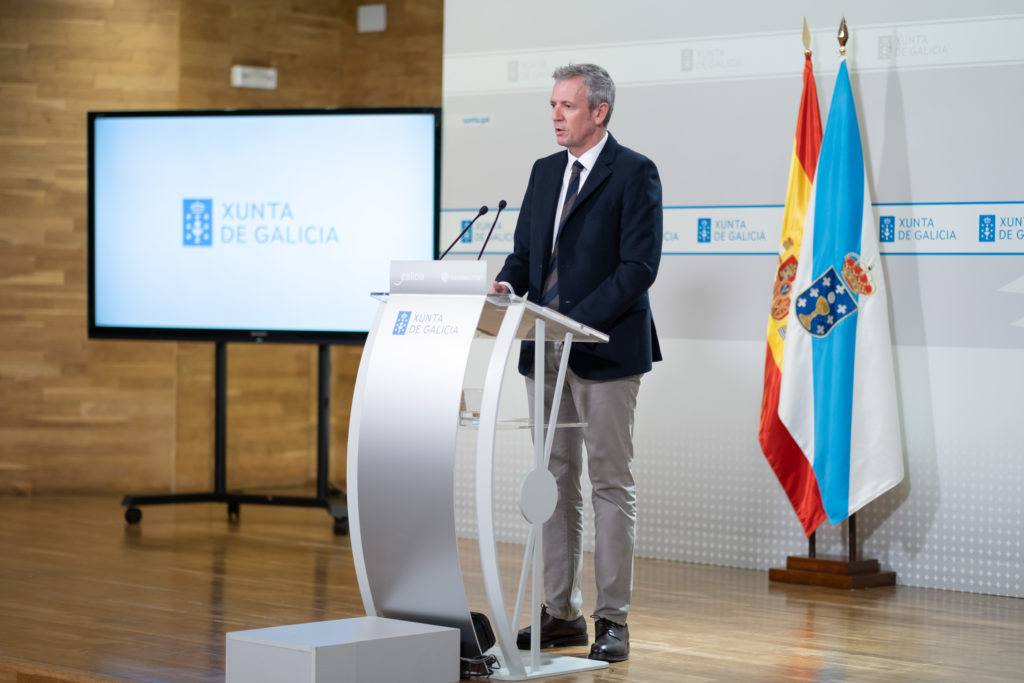
"With an investment of more than 800 million euros, the centre is expected to create 2,500 direct jobs and generate synergies with other key sectors of the Galician economy, such as forestry and textiles," said the president. It is oriented to the production of textile fibres with the forecast of achieving 200,000 tons per year of lyocell, a high quality fabric that has a growing implantation in the textile industry for representing an ecological alternative to artificial fibres of fossil origin.
The factory project to be installed in Palas de Rei is the only one of its kind currently planned in Europe and integrates the pulp and lyocell plants, as well as favouring synergies with other initiatives under development in the Galician ecosystem. It is expected to have a dynamising impact on the area by prioritising the hiring of local workers, thus contributing to the objective of setting the population in rural areas.
The declaration as a strategic industrial project is in line with the philosophy of the Law of administrative simplification and support for the economic reactivation of Galicia, which seeks to attract investment. It will allow the reduction by half of the deadlines - except those relating to the submission of applications and appeals - while maintaining the technical, legal and environmental guarantees.
The plant meets all the requirements to be a strategic industrial project, as it exceeds the minimum investment of 20 million euros and the creation of at least 100 jobs - Altri expects to generate 2,500 direct jobs - . It also meets the requirement that the initiatives must complement value chains, belong to strategic sectors or be aligned with the objectives of the European Union or be integrated into the NextGeneration funding.
Impulsa Galicia analyses with the President of the Xunta de Galicia the progress of the main transformational projects underway
Alfonso Rueda highlights the community's commitment to alternative energies and initiatives to promote the circular economy that will place Galicia at the forefront of renewables and the sustainable economy.
The Impulsa Galicia technical committee met with the President of the Xunta de Galicia, Alfonso Rueda, to analyse the main strategic projects launched for the advancement of the region and the opportunities for their development.
Specifically, the committee reported on the status of leading initiatives such as projects revolving around the recovery of textile fibres, technological advances at the service of the community or the implementation of alternatives that enable Galician society and its business sector to compete in the field of energy.
Impulsa's technical committee agreed that the projects the company is working on within the Galician Transformation Hub show a commitment to alternative energies and initiatives to promote the circular economy that will place the region at the forefront of renewables and the sustainable economy.
Impulsa Galicia presents itself in front of Galician society as the optimal tool to gain investments and carry out strategic projects
The dissemination session count on the presence of Alfonso Rueda, Francisco Conde, Juan Carlos Escotet and the representative from society’s executive committee, as well as representatives from two of the most advanced projects: one about the sustainable management of Galician forests and other about circular economy
November 8th, 2022.
Impulsa Galicia, the private-public partnership created for the development of strategical projects, was presented in front of a well-stocked representation of Galician’s society as an optimal tool, unique in Spain, for investment channelling and the articulation of strategic projects worthy of European funds. In one of its dissemination sessions organized in Santiago de Compostela, representatives of its shareholders attended, both public and private, and the promoters of the main projects underway: the sustainable management of Galician forests and the circular economy.
Created in April of 2021 by the Xunta de Galicia (40%), Abanca (38%), Reganosa (12%) and Sogama (10%), Impulsa Galicia has been entrusted with the development of business initiatives that have an impact on the dynamization, progress and transformation of Galician economy through a green and digital model. It was created with the aim of encouraging productive activity in the autonomous community by attracting investment, incorporating partners and collaboration between public and private institutions for the subsequent implementation and consolidation of business proposals.
This was stated by Francisco Conde, president of Impulsa Galicia, in his welcome speech. He emphasized that this company was created with the aim of contributing to the green and digital transformation of the Galician business network. "It is an opportunity to transform the industrial network from innovation and sustainability, creating quality employment," said the first vice-president of the Government of Galicia.
For his part, the president of Abanca, Juan Carlos Escotet, in his speech on behalf of the private shareholders of Impulsa Galicia, reaffirmed the bank's commitment to facilitate access to European funds, attract new investors and show that Galicia "is a land of opportunities".
The conference also included a round table discussion between two members of the company's executive committee, Emilio Bruquetas, general manager of Reganosa, and Juan Luis Vargas-Zúñiga, general manager of Capital Markets, Management and Institutional Distribution of Abanca, moderated by the company's general manager, Enyd López. In it, Emilio Bruquetas emphasized that the projects in the portfolio had their origin in the Polo para la Transformación de Galicia, which arose to get out of the crisis caused by the pandemic sooner and better. There, a series of strategic tractor projects for the Galician economy and interconnected with each other were identified. "They are projects that take advantage of the competitive advantages that Galicia has, that generate inputs and outputs among all of them, and we are sure that there are many more that can be part of this ecosystem," said Bruquetas.
Along these lines Vargas-Zúñiga insisted: "There was a first phase of ideas and now we must promote other projects where other entrepreneurs participate, where we attract a qualified population". He guaranteed that they have the capacity to make financing reach the companies in a "faster and more efficient" way. And he claimed Impulsa Galicia as a facilitator of economic resources flowing for strategic projects such as the creation of a large data centre based in Galicia, "which can generate new jobs and a differentiating productive network". "Impulsa belongs to Galician people and its doors are open to entrepreneurs, so that an idea can come and we can conceptualize it," he said.
In a second table, also moderated by the general manager of the company, two of the great projects already known were detailed without much significance. On the one hand, the vice-president of Altri's executive committee, Carlos Van Zeller, the company behind the project for the sustainable management of Galician forests consisting of the start-up of a sustainable textile fiber factory in Palas de Rei, explained that there are currently 100 engineers working on the design of the textile complex and that all the permits and licenses are being processed. "The critical point is, undoubtedly, the funding", he stated, "we held up to five meetings with the Spanish Government and it is urgent to know if European funds will be allocated to this project, which should have a particular PERTE due to the volume of investment required".
On the other hand, Silvia Sanjoaquín, director of New Businesses of Naturgy, and Natalia Barreiro, director of the Repsol industrial complex in A Coruña, delved into the circular economy project that will use the surplus of bovine, pig and poultry slurry to produce biogas and fertilizer. They highlighted the public-private collaboration as key to the development of this project, which they affirm "is unique in Spain and Europe" and "generates quality employment in the framework of the energy transition in sparsely populated areas". The biogas produced will make it possible to "decarbonize Galician transport, homes and industry".
Finally, the president of the Xunta de Galicia, Alfonso Rueda, closed the day, stating that the initiatives developed under Impulsa Galicia together add up to "millions of euros of investment and the expected generation of thousands of jobs". "They are viable, realistic projects, and they can be a happy reality and a source of wealth for Galicia", he declared. He also reclaimed the involvement of the central government, through the European funds, for the attainment of financing of these projects. "From here we did exactly everything that was demanded from Brussels and Madrid", he guaranteed.
The Xunta highlights that the circular economy centre will increase Galicia's energy autonomy and job opportunities, especially in rural areas
The first Vice-president and Regional Minister of Economy, Industry and Innovation, Francisco Conde, and the Regional Minister for the Rural Environment, José González, held a meeting with representatives of Reganosa, Repsol and Naturgy, accompanied by the general director of Impulsa Galicia, Enyd López.
The First Vice-President and Regional Minister of Economy, Industry and Innovation, Francisco Conde, and the Regional Minister for the Rural Environment José González, held a meeting this morning with Reganosa, Repsol and Naturgy, which, together with Impulsa Galicia and the Xunta, are promoting the future circular economy centre for the production of biogas and fertilisers from livestock waste.
According to Conde, this initiative will increase Galicia's energy autonomy and employment opportunities, especially in rural areas, and demonstrates how public-private collaboration enables the generation and development of proposals that improve Galicia's industrial capacities.
The project, which will cost 146 million euros in the first phase, stands out for its innovative component, its environmental benefits, its support for rural areas, and for being framed within the challenge of energy transition. The initiative would cover 7% of Galicia's demand for imported natural gas with biomethane.
In this regard, the economic vice-president of the Xunta highlighted the role played by the company Impulsa Galicia. Together with Altri, this is the second project to be matured and developed under the auspices of this public-private entity created with the function of identifying proposals and consolidating them as viable initiatives.
Thus, the circular economy project is the result of many months of previous work, and the forecast of the promoting partners is to start the basic engineering work next November. This is one of the major proposals with which Galicia is applying for European Next Generation funds, and for this reason, the Xunta hopes that once and for all the Government will show its involvement with this project, which is also one of the projects selected to participate in the calls for proposals of the Just Transition Fund.
For his part, the Regional Minister for the Rural Environment, José González, stressed that this circular economy project, which seeks to transform surplus slurry and other waste into biomethane and organic fertilisers, will guarantee at all times the availability for livestock farmers of the livestock excrement needed to fertilise their land in a sustainable way, as well as the economic viability of their farms.
In his speech, José González specified that the first anaerobic digestion plant to produce renewable gas from surplus bovine, pig and poultry excrement mixed with other waste from the agri-food sector is to be installed in Meirama. In the first phase, five pre-treatment centres associated with this plant will be set up in the provinces of A Coruña and Lugo, taking into account the distribution of Galician farms, with the idea of extending the circular economy project to Ourense and Pontevedra, thus establishing a comprehensive network for the treatment of surplus livestock excrement, bringing the initiative closer to the places where there are livestock farms.
The Regional Minister for the Rural Environment added that the implementation of this initiative would also contribute to compliance with the new European environmental legislation on the protection of agricultural land and effluent control, as well as sustainable nutrition of agricultural land, and would provide a solution to recurring issues in the management and storage of livestock excretions.
The Regional Minister also highlighted the collaboration of the sector in carrying out this initiative, pointing out that he will shortly begin a round of meetings with cooperatives, livestock associations and agricultural organisations to explain the project to them, always seeking the viability of Galician farms.
Reganosa, Repsol and Naturgy collaborate with Impulsa Galicia in the promotion of a project to transform surplus slurry and other waste into biomethane and organic fertilizers
In an initial phase, once the required administrative authorizations have been obtained, the three energy companies would invest 146 million euros to generate 300 GWh of renewable energy annually with 1.2 million tons of livestock manure
The first production plant of this programme is planned in Meirama, with five pre-treatment centres associated
The initiative would make it possible to reduce external energy dependence and develop the circular economy in the autonomous community. In its full deployment, it would avoid the emission of 500,000 tons of CO2 equivalent per year and up to 600 direct and 1,900 indirect jobs would be created
The companies thus contribute to decarbonising Galician transport, industry and agri-food activity
The project has been presented to four central government ministries with the aim of fitting it into Next Generation funds
28 September 2022
Reganosa, Repsol and Naturgy collaborate with Impulsa Galicia to develop the circular economy with a project that would transform surplus livestock manure and other waste on a large scale into biomethane, organic fertilizers and CO2 neutral of biological origin. This initiative has been designed to optimise slurry management in the autonomous community, reduce energy dependence on the outside, facilitate compliance with new European standards and help decarbonise industry, households and mobility. The promoters are currently carrying out fieldwork and trials that give continuity to months of previous studies and research.
The project consists of progressively deploying throughout the territory a network of plants that value surpluses of bovine, porcine and poultry slurries mixed with a smaller amount of FORS (organic fraction of separate collection) and RIO (organic industrial waste) of the agri-food sector for the production of renewable energy. This is reflected in the memorandum of understanding that Reganosa, Repsol and Naturgy have recently signed with Impulsa, the mixed society promoted by the Xunta de Galicia with the aim of accompanying business initiatives that affect the dynamization, progress and transformation of the Galician economy through a green and digital model.
In an initial phase, the three energy companies plan to build a first anaerobic digestion plant that produces renewable gas and five pre-treatment plants associated with it to dehydrate the surplus bovine slurry. The renewable gas generation plant would be located in Meirama (Cerceda), a fair transition zone, while the five pretreatment plants would be divided, in a first phase, by municipalities in the same province of Coruña and Lugo, according to a distribution based on the Galician map of livestock farms, thus optimizing logistics between both types of facilities.
With an investment of approximately 146 million euros, in this first phase, 1,240,000 tons of surplus slurry would be treated annually and, in addition to organic fertilizers and CO2 neutral, about 300 gigawatts per hour (GWh) of biomethane would be produced and injected into the natural gas network. This renewable gas would be used to decarbonize different sectors, such as transport, residential and industrial, and could be used in the processes of the Repsol refinery in A Coruña.
Extension to all Galicia
Once this initial phase has been completed, the promoters intend to extend the circular economy project in the future to the whole of Galicia, implementing a centralised network for the treatment of surplus livestock manure. This system will ensure the availability to livestock farmers of the slurry necessary to sustainably fertilise their land, as well as the economic viability of their farms. The developers' calculations show that around 6 million tonnes of waste could be recovered each year. Rounding off, the biomethane produced (1 TWh per year) would be equivalent to 7% of the natural gas imports that are now demanded in Galicia, with which the community would substantially advance in its energy autonomy and in the consumption of renewables. The project has been submitted to four ministries of the central Government (Economy, Ecological Transition, Agriculture and Industry) with the aim of fitting it into the Next Generation funds, both for its circularity component and for the fact that it provides a green and indigenous energy source from the surplus of livestock manure.
In this way, the global project would also avoid the emission into the atmosphere of about 500,000 tons of CO2 per year and create quality jobs in the context of the ecological transition and in sparsely populated areas. In short, just over 600 direct and 1,900 indirect jobs, considering both the operation of the plants and transport logistics.
The implementation of this initiative would contribute to compliance with the new European environmental legislation on the protection of agricultural soil and effluent control, as well as sustainable nutrition of agricultural soil, and would address recurrent issues in slurry management and storage.
Innovative for its concept of global integration in the face of dispersion, this project exemplifies at the same time the new model of public-private cooperation and between companies in the same sector, being open to the participation of other companies.
"The parties involved in this project have worked very intensively to provide a solvent technical solution; now we need to create the regulatory framework that allows us to develop and implement the advances," said Reganosa CEO Emilio Bruquetas, who calls for policies that encourage "in a clear way" the production of biogas in Spain.
The director of Renewable Fuels of Repsol, Berta Cabello, for her part, has indicated that "with this project, strategic for Repsol, we promote the reduction of greenhouse gas emissions from transport and industry, we increase the energy autonomy used renewable gases obtained with local resources and at the same time we promote the circular economy and the sustainability of such an important sector in our country as livestock".
The general director of Renewables, New Businesses and Innovation of Naturgy, Jorge Barredo, stressed that "this biomethane production project will boost the energy transition in Galicia and promote sustainable waste management, taking a step forward towards the circular economy and local socio-economic development, in addition to contributing to reduce energy dependence from abroad".
“This,” said Impulsa CEO Enyd López, “is a very relevant project for Galicia. In its conception and support, the Xunta has advanced twofold: on the one hand, favouring an agile decarbonisation of the economy, and on the other, making it easier for livestock farmers to comply with the regulations that will come from Europe. “And she added: "In addition to promoting the circular economy in isolation, this initiative will help generate an ecosystem of solid projects within the Pole for the Transformation of Galicia."
The Xunta highlights that the As Pontes hydrogen plant project describes what is a fair energy transition for Galicia
The first Vice-president and Regional Minister of Economy, Industry and Innovation, Francisco Conde, attended this morning in As Pontes the presentation of the project in which Reganosa and EDP Renovables foresee an investment of 155M€.
The first Vice-president and Regional Minister of Economy, Industry and Innovation, Francisco Conde, stressed today that the As Pontes hydrogen plant project describes what is a fair energy transition for Galicia. "It is a strategic project to address the process of reindustrialisation of the area", he said and highlighted the institutional collaboration between the Xunta and the City Council - with the confidence that the Government will also join in - together with the collaboration with the business community.
The first Vice-president attended this morning the presentation of this project promoted by Reganosa and EDP Renovables, which foresees an initial investment of €130 million which, adding the different necessary connections, could reach €155 million and have the first phases in operation in 2025.
Conde stressed that the hydrogen plant will allow technological developments to be linked to industrial processes to generate a positive impact on job creation and opportunities. Thus, he advanced that the technological partner of the Reganosa and EDP Renovables project, Siemens Energy, will assemble the electrolysers at the Navantia turbine factory.
As he stressed, the project is part of Galicia's Energy Agenda 2030, in which one of the objectives is the development of renewable energies - Galicia is currently the second largest generator of this type of energy - both traditional and new technologies such as offshore wind or green hydrogen.
Conde explained that the companies have been working for more than two years on this "mature and innovative" project. It was presented to the PERTE* for renewable energy and requested to be declared by the Galician Administration as a strategic industrial project, which would allow greater agility by having a single file to carry out the administrative processing, sectoral analysis and obtaining the necessary licenses. Conde stressed that the presence of this plant is in addition to other industrial projects in the region that will allow its reindustrialisation.
Rueda highlights the value of the collaboration between the Xunta and the Impulsa Galicia Company to face the challenges of the next generations
He requests the commitment of the central government to ensure that these strategic initiatives for Galicia can be implemented as soon as possible.
The head of the Galician Government, Alfonso Rueda, today highlighted the collaboration between the Xunta de Galicia and the Impulsa Galicia Company to face the challenges of the next generations.
In a meeting with the Board of Directors of the entity, the President of the Xunta highlighted the value of the experts' proposals to advance in projects of importance for the country, such as the Galician Transformation Hub.
Alfonso Rueda stressed that the Impulsa Galicia Company was launched in the midst of the pandemic as a forum for public-private collaboration. A company that was born from the proposal made by the Committee of Experts promoted by the Xunta "to draw the way forward" and to which the Galician President thanked "its excellent vision" to face the challenges of the Galicia of 2030, "the one we want to leave to the next generations".
Rueda also stressed the importance of public-private collaboration to boost the growth and consolidation of Galicia's business fabric. "What we need for Galicia are good ideas and good projects", and he gave as an example those that led to the creation of the Galician Transformation Hub, "with national and international companies of recognised prestige".
The head of the Xunta de Galicia insisted on the need for the central government to specify the distribution of aid so that projects that are essential for the economic and industrial development of Galicia are not left out of the PERTE.
Impulsa Galicia presents to the President of the Xunta the main projects it is working on
Rueda requests the commitment of the central government so that these strategic initiatives for Galicia can materialise as soon as possible
The President of the Xunta de Galicia, Alfonso Rueda, held a meeting this morning with the technical committee of the Impulsa Galicia Company, in which the main projects on which Galicia is already working to attract European Next Generation funds were evaluated.
Thus, the Altri sustainable textile fibre factory project is included within the Galician Transformation Hub promoted by the Xunta with the help of the Impulsa Company - in which Abanca, Sogama and Reganosa also participate -. This will be an important milestone in the industrial transformation of Galicia, with an investment of 800 M€ and 2,500 direct and indirect jobs.
As highlighted at the meeting, two other projects integrated in the Hub revolve around this initiative, which serve as a source of energy for the planned factory in Palas de Rei (Lugo): the development of a biomethane production plant from slurry and the development of a green hydrogen centre.
In addition, Rueda highlighted during the meeting that the different projects included in the Galician Transformation Hub are of a strategic nature and have a great capacity of traction on the Galician business fabric, which ensures growth, employment and competitiveness, responding to the challenges that the current context requires from the economic, environmental and social point of view.
For this reason, he stressed, it is hoped that in the framework of the necessary collaboration between administrations, the central government will demonstrate its commitment through the Next Generation funds. Therefore, the Xunta de Galicia is waiting for the President of the Government, Pedro Sánchez, to respond to the request for a meeting as requested by the President of the Galician Executive in view of the need to speed up and decentralise European funds, with the aim of these strategic projects materialising as soon as possible, benefiting above all small and medium-sized enterprises.
The Impulsa Company is a public-private mechanism in which the regional government (40%), Abanca (38%), Reganosa (12%) and Sogama (10%) participate. This company is responsible for accelerating the development of new business projects, such as this textile fibre factory, which contribute to generating economic activity and value chains from which small and medium-sized Galician companies in particular can benefit.
The forestry sector learns about Altri’s textile fibre factory project at a conference organised by Impulsa Galicia
The Xunta assures that the textile fibre factory will be a boost for the digitalisation of the forestry industry and new uses of wood.
The Galician government guarantees maximum administrative flexibility as it considers this initiative a strategic industrial project.
The Xunta has announced its intention to hold a new meeting with the central government to identify the instruments, within the European funds, in which this project can fit.
4 May 2022
The Vice-President for Economy and Acting Regional Minister of Economy, Enterprise and Innovation, Francisco Conde, and the Acting Regional Minister of Rural Affairs, José González, together with the CEO of Altri, Jose Sonar, and the general manager of the company Impulsa Galicia, Enyd López, held a meeting this morning in the Cidade da Cultura with the Galician forestry sector about the textile fibre factory project.
In his speech, Conde assured that the textile fibre factory would be a boost for the forestry industry, both from the point of view of the new uses in wood, as well as the digitalisation of the sector and progress in eco-innovation and eco-design. He also highlighted the capacity of this initiative to generate quality employment and attract both new industries and investments in the forestry and textile sectors. In this regard, Altri foresees the creation of more than 2,500 direct and indirect jobs and an investment of 800 million euros.
The Acting Vice-President for Economy pointed out that what matters now is the development of a joint work of all the administrations so that the factory generates the desired impact. Thus, he explained that for the Xunta it will be a strategic industrial project, which will allow its processing to be more agile, which will help to reduce the processing times by half, while maintaining all legal, technical and environmental guarantees.
Conde also recalled that the central government is aware of this project, as it is one of those that Galicia selected and presented as a priority, as requested by the state government. He advanced the intention of the Xunta to hold a new meeting with the central government to update the status of the project and identify the instruments, within the European funds, that would allow is implementation.
Conde thanked Altri for its confidence and commitment to establish itself in Galicia and stressed that it is a project will generate value throughout the forest-industry chain. The meeting evaluated the impact of the factory on the Galician forestry sector, which produces 10 million cubic metres of industrial wood; and explained the tools available to the Galician government to ensure the diversity of forest resources such as the Galician Forest Plan or the preparation of the permanent forest inventory.
This project will provide an important boost for the rural environment and for the sustainable management of Galicia’s forests and forestry.
The Xunta sees the textile fibre factory as a project that will contribute to industrial transformation by creating value throughout the forestry chain in Lugo and Galicia
The Vice-President for Economy and Acting Regional Minister of Economy, Enterprise and Innovation, Francisco Conde, the Acting Regional Minister of Rural Affairs, José González, and the Regional Delegate of the Xunta in Lugo, Javier Arias, participated this morning in an informative meeting with the CEO of Altri, Jose Sonar, and the general manager of the company Impulsa Galicia, Enyd López.
The Galician government guarantees maximum administrative flexibility as it considers this initiative a strategic industrial project.
Conde stresses that this factory fits into the industrial-sustainability binomial and exemplifies the commitment to public-private collaboration.
3 May 2022
The Vice-President for Economy and Acting Regional Minister of Economy, Enterprise and Innovation, Francisco Conde, the Acting Regional Minister of Rural Affairs, José González, and the Regional Delegate of the Xunta in Lugo, Javier Arias, participated in an informative meeting with the CEO of Altri, Jose Sonar, and the general manager of the company Impulsa Galicia, Enyd López, celebrated this morning in Lugo, on the Palas de Rei textile factory project.
The Galician government considers that this project will contribute to industrial transformation by creating value throughout the Galician forestry chain, through an investment of 800 million euros and the forecast creation of more than 2500 direct and indirect jobs.
Conde stressed that this factory fits into the industrial-sustainability binomial because it meets the criteria set by the European Commission for the development of a green economy, and exemplifies the commitment to public-private collaboration to carry out the major projects with which Galicia aspires to European funds. In this regard, he reiterated the need for the central government to be committed, as this is an opportunity in which all administrations must do their part.
The Acting Vice-President for Economy explained that the Xunta has given Altri the utmost confidence to bet on establishing itself in Galicia, considering the industrial project to be strategic, in order to ensure administrative agility.
For his part, the Acting Regional Minister for the Rural Environment, José González, stressed that this initiative “has no equal anywhere else in the world”, by the fact of closing the production cycle and also do so with closeness to the resource, i.e. the wood.
González defined the project as a “success story” of public-private collaboration and recalled that it was configured from the outset as a sustainable forest management initiative, starting from a resource of Galicia’s own, “very important in this province”, such as wood. In this respect, he pointed out that our region accounts for half of all timber harvests in Spain, with 10 million cubic metres last year, and that we have “great potential for growth”, because the figure for 2015 was 7.6 million.
In addition, the head of the Rural Environment Department described the project as “clearly bankable” within the framework of the Next Generation funds, because it meets two fundamental requirements, such as sustainability and circular economy. Besides, the regional minister linked this initiative with the development of the Galician Forestry Plan 2021 – 2040, in the sense that it represents a “clear commitment to the certification of our forests”. A certification that, he added, in the Galician case is led by environmental organisations “that are accrediting that in Galicia there is a multifunctional, biodiverse and orderly forest”.
At the meeting, it was explained that the location of the factory was carried out from a technical evaluation process in which 46 possible sites were studied taking into account various criteria such as the availability of a sufficient and constant water resource; the availability of 150 hectares of land; the flat orography with the possibility of expansion; compatibility with urban, heritage and environmental regulations; proximity to wood and to energy and transport infrastructures, as well as the distance to population centres.
This project will be an important boost for the rural environment and for the sustainable management of Galicia’s forest and forestry.



